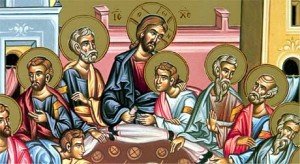The Christian concept of anamnesis has Jewish roots and was tied to the covenant theology and worship practice of ancient Israel. Indeed, anamnesis in Christianity coincides with the Jewish understanding of zikkaron, a Hebrew word which has been rendered as a memorial reenactment. One author, Smolarski, explains it as remembrance “that makes the effects of a historical event present and effective for the believer.”
In accordance with our Christian understanding, the covenant by which God bestowed Canaan upon the Israelites by striking down the Egyptians while passing over the Israelites in Egypt, has not been abrogated. On the contrary, much as Israel has been instructed to commemorate “the Passover sacrifice of Yahweh”, Christians make present for all time the salvific Passover offering of Jesus Christ. The Pasch of Christ, by which a “new covenant” is established between God and man, is the actualization and fulfillment of the ancient “covenant with Abraham, Isaac, and Jacob”. Truly the synoptic gospels present Jesus as instituting the Eucharist during a Passover meal celebrated with his followers, giving to the Passover a new and distinctly Christian memory. Jesus gave to an eternal covenant a new sacramental and anamnetic significance. Therefore, by Christian initiation believers are drawn into Christ’s paschal mystery by participation in the present moment. We who were baptized into Christ were baptized into his life, death and resurrection. We were indeed buried with him through baptism into death, so that, just as Christ was raised from the dead by the glory of the Father, we too might live in newness of life.
On one hand, both the Old and New Testaments are replete with the notion of anamnesis, as the remembrance of God’s past action that leads to “newness of life” in the present. On the other hand, the Greek anamnesis and the Hebrew zikkaron, which has the nearest meaning to anamnesis, are not common words in Scripture. Derivatives of zikkaron appear fifty-nine times in the Hebrew Scriptures, and its usage is most often connected to temple sacrifice. Anamnesis appears only nine times in the Septuagint and, in the New Testament, anamnesis and similar words are even rarer, with only seven appearances

